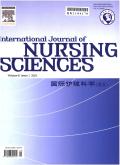Effects of the “Internet +” nursing model based on user profiling on postoperative recovery in breast cancer: A prospective randomized controlled clinical trial
IF 3.1
3区 医学
Q1 NURSING
引用次数: 0
Abstract
Objectives
This study aimed to explore the effectiveness and advantages of an “Internet +” nursing model based on user profiling in the rehabilitation of postoperative breast cancer patients.
Methods
Breast cancer patients admitted to the hospital from July 2023 to September 2024 were enrolled. These patients were randomly assigned to a control group and an intervention group, with 52 patients in each group. The control group received routine nursing care, while the intervention group received an “Internet +” nursing intervention based on user profiling in addition to routine care. The intervention period lasted for one month following discharge. Before and one month after the intervention, the Fear of Progression Questionnaire-Short Form (FOP-Q-SF), the Fear of Cancer Recurrence Inventory-Short Form (FCRI-SF), Chinese Posttraumatic Growth Inventory (C-PTGI), and the Functional Assessment of Cancer Therapy-Breast (FACT-B) were applied to assess the effects of interventions.
Results
A total of 104 patients were analyzed. After the intervention, FOP-Q-SF and FCRI-SF scores were significantly lower in the intervention group compared to the control group, with statistical significance (t = 3.98, P < 0.001; t = −7.59, P < 0.001), and Cohen’s d of 0.781 and 1.49, respectively. Additionally, C-PTGI and FACT-B scores in the intervention group were significantly higher than those in the control group (t = −6.534, P < 0.001; t = −4.579, P < 0.001), with Cohen’s d of 0.585 and 0.656.
Conclusions
An “Internet +” nursing model based on user profiling could reduce postoperative breast cancer patients fear of disease progression and cancer recurrence, also enhancing posttraumatic growth and overall quality of life.
基于用户画像的“互联网+”护理模式对乳腺癌术后康复的影响:一项前瞻性随机对照临床试验
目的探讨基于用户图谱的“互联网+”护理模式在乳腺癌术后患者康复中的效果及优势。方法选取2023年7月至2024年9月在该院住院的乳腺癌患者。这些患者被随机分为对照组和干预组,每组52例。对照组接受常规护理,干预组在常规护理的基础上进行基于用户画像的“互联网+”护理干预。出院后随访1个月。在干预前和干预后1个月,分别采用进展恐惧问卷短表(top - q - sf)、癌症复发恐惧问卷短表(FCRI-SF)、中国创伤后生长量表(C-PTGI)和乳腺癌治疗功能评估(FACT-B)来评估干预效果。结果共分析104例患者。干预后,干预组FOP-Q-SF、FCRI-SF评分显著低于对照组,差异均有统计学意义(t = 3.98, P <;0.001;t =−7.59,P <;0.001), Cohen’s d分别为0.781和1.49。干预组C-PTGI和FACT-B评分显著高于对照组(t = - 6.534, P <;0.001;t = - 4.579, P <;0.001), Cohen’s d分别为0.585和0.656。结论基于用户图谱的“互联网+”护理模式可以降低乳腺癌术后患者对疾病进展和癌症复发的恐惧,提高创伤后生长和整体生活质量。
本文章由计算机程序翻译,如有差异,请以英文原文为准。
求助全文
约1分钟内获得全文
求助全文
来源期刊

International Journal of Nursing Sciences
Nursing-Nursing (all)
CiteScore
6.10
自引率
2.60%
发文量
408
审稿时长
25 days
期刊介绍:
This journal aims to promote excellence in nursing and health care through the dissemination of the latest, evidence-based, peer-reviewed clinical information and original research, providing an international platform for exchanging knowledge, research findings and nursing practice experience. This journal covers a wide range of nursing topics such as advanced nursing practice, bio-psychosocial issues related to health, cultural perspectives, lifestyle change as a component of health promotion, chronic disease, including end-of-life care, family care giving. IJNSS publishes four issues per year in Jan/Apr/Jul/Oct. IJNSS intended readership includes practicing nurses in all spheres and at all levels who are committed to advancing practice and professional development on the basis of new knowledge and evidence; managers and senior members of the nursing; nurse educators and nursing students etc. IJNSS seeks to enrich insight into clinical need and the implications for nursing intervention and models of service delivery. Contributions are welcomed from other health professions on issues that have a direct impact on nursing practice.
 求助内容:
求助内容: 应助结果提醒方式:
应助结果提醒方式:


